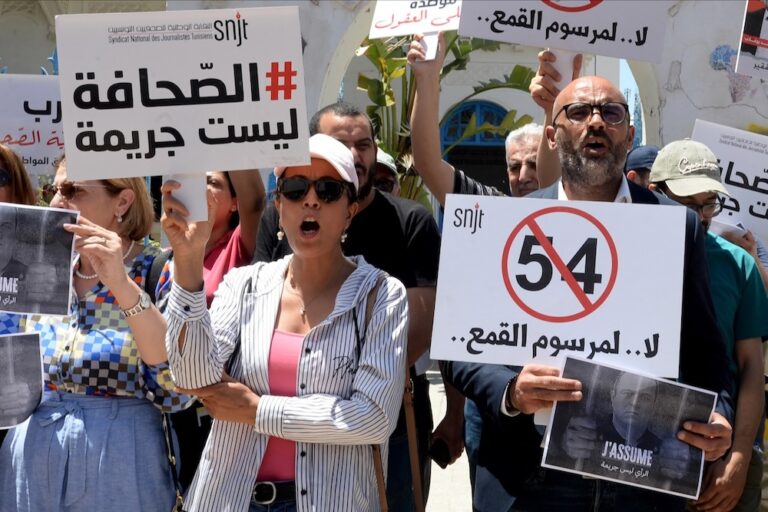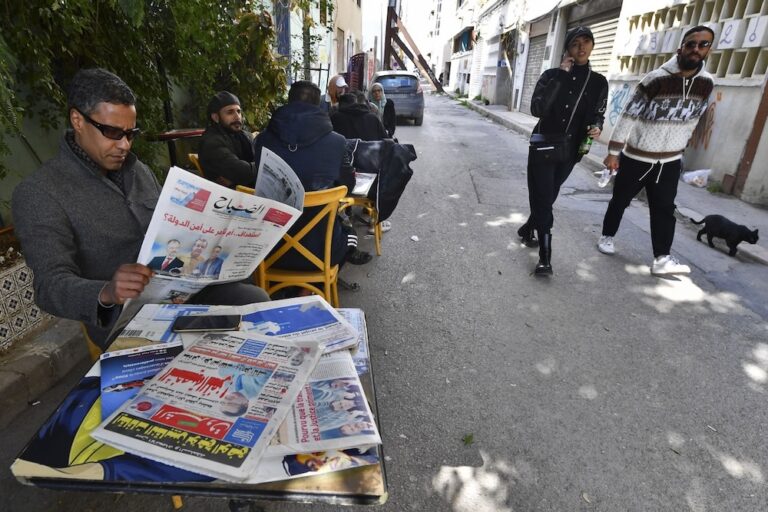The objective of workshops held in five cities in early July was to present the concept of community media and listen to the voices of local journalists and civil society actors.
(AMARC/IFEX) – Tunisia, July 12, 2011 – International Media Support (IMS) and the World Community Radio Association (AMARC) in collaboration with Syndicat Tunisien des Radios Libres (STRL) conducted five community media workshops in different regional cities of Tunisia (Le Kef, Kasserine, Gafsa, Gabes and Bizerte) from July 5 to 10, 2011. The objective of the workshops was to present the concept of community media, especially community radio and community media centers, and listen to the voices of local journalists and civil society actors and their perceptions of developing media diversity in their region.
The AMARC, IMS and STRL team was warmly welcomed. The workshops were well attended by media people, amateur broadcasters who run internet radios stations and civil society representatives such as women’s associations, citizenship groups, organizations of unemployed graduates, AIDS prevention groups, revolution committees, etc. The message about the workshops traveled fast by word of mouth and despite the hot temperatures in the interior of the country, people travelled long distances to participate. Each workshop had between 20 and 40 participants.
“Central Tunisia is one of the forgotten regions of national development, but at the same time we are the center of the revolution,” said Chedly Tlili, of Radio Chambi FM, Kasserine.
In Kasserine the people were deprived of any regional media such as newspapers, radio or TV by the Ben Ali dictatorship. They felt very inspired by the idea of community media, in particular community radio and community TV. It would significantly contribute to the development of the region, which is based on agricultural production and has a rich cultural inheritance.
The mission was very timely as the Instance Nationale de la Réforme de l’Information et de la Communication (INRIC) recently recommended 12 local radio projects to the Prime Minister to be granted broadcast licenses. Among them are three community radio stations (Radio Chambi FM, Kasserine; Radio Sawt El Manajem, Gafsa and Radio 6, Tunis). In the different cities all the radio projects that were recommended for licenses attended the workshops and said they got a lot of new ideas on how to run their radio stations. The workshops also constituted a welcome opportunity for networking amongst media and civil society actors outside of Tunis.
“We really have to seek direct collaboration with the miners of Gafsa, who are the target audience of our radio station, but we should also cater to other people, especially the women living in Gafsa,” said Fahen Boukaddous, of Radio Sawt El Manajem.
“I could imagine that within our commercial radio station we could open up windows for community radio produced by civil society associations,” said Kamel Robbana, of Oxygene.FM, Birzeite.
The workshops held last week will be followed up by IMS and AMARC with concrete support for certain pilot projects and collaboration with existing community media projects as well as new initiatives. The objective is to support decentralization and diversification of the media in Tunisia and strengthen the community media sector.
“The energy and the desire for positive change in Central Tunisia is tangible. There is a lot of frustration outside the capital. People have only experienced censured and centralized media coming from Tunis. ‘It’s like we don’t exist’, one of the workshop participants in Kasserine said. But the frustration can be channelled positively. Local media, community media can give large parts of the rural population a voice. And as a young man put it, ‘we have to be the change we want to see’,” said Lotte Grauballe of IMS.
“The development of community radio in the smaller towns has great potential to reach out to the large sectors of society who do not have access to the internet, such as women and agricultural workers. It’s important to involve women from the very beginning of any community media project,” noted Bianca Miglioretto of AMARC.


